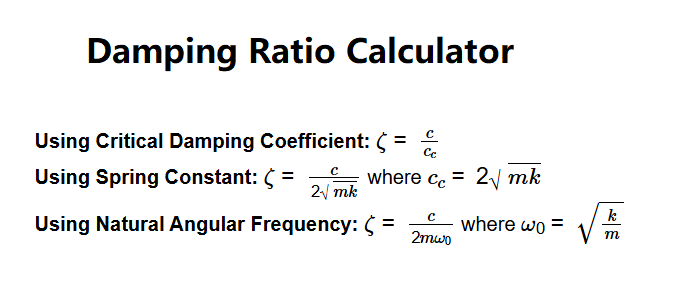 Home
Home
 Back
Back

Damping Ratio Calculator computes the damping ratio (ζ) of a system, which indicates how oscillations in a dynamic system decay over time.
It is widely used in mechanical engineering, control systems, and physics to analyze the behavior of damped harmonic oscillators.
Select the calculation method and input the required values. The formulas are:
Use the form above to input values, and the calculator will provide the damping ratio.
Example (Using Spring Constant): Damping Coefficient = 100 N/m*s, Suspended Mass = 2 kg, Spring Constant = 50 N/m.
Calculation: \( c_c = 2 \sqrt{2 \cdot 50} = 2 \sqrt{100} = 20 \, \text{N/m*s} \), \( \zeta = \frac{100}{20} = 5 \)
Enter these values (c = 100 N/m*s, m = 2 kg, k = 50 N/m) with Spring Constant selected to verify.
1. What does the damping ratio measure?
The damping ratio (ζ) measures how quickly oscillations decay, with ζ < 1 indicating underdamping, ζ = 1 critical damping, and ζ > 1 overdamping.
2. Why is the damping ratio dimensionless?
It is a ratio of two coefficients with the same units, canceling them out.
3. What is critical damping?
Critical damping (c_c) is the minimum damping that prevents oscillation, calculated as \( c_c = 2 \sqrt{mk} \).
4. How do I choose the right method?
Select based on available data: use Critical Damping if c_c is known, Spring Constant if mass and spring data are available, or Natural Angular Frequency if ω₀ is known.